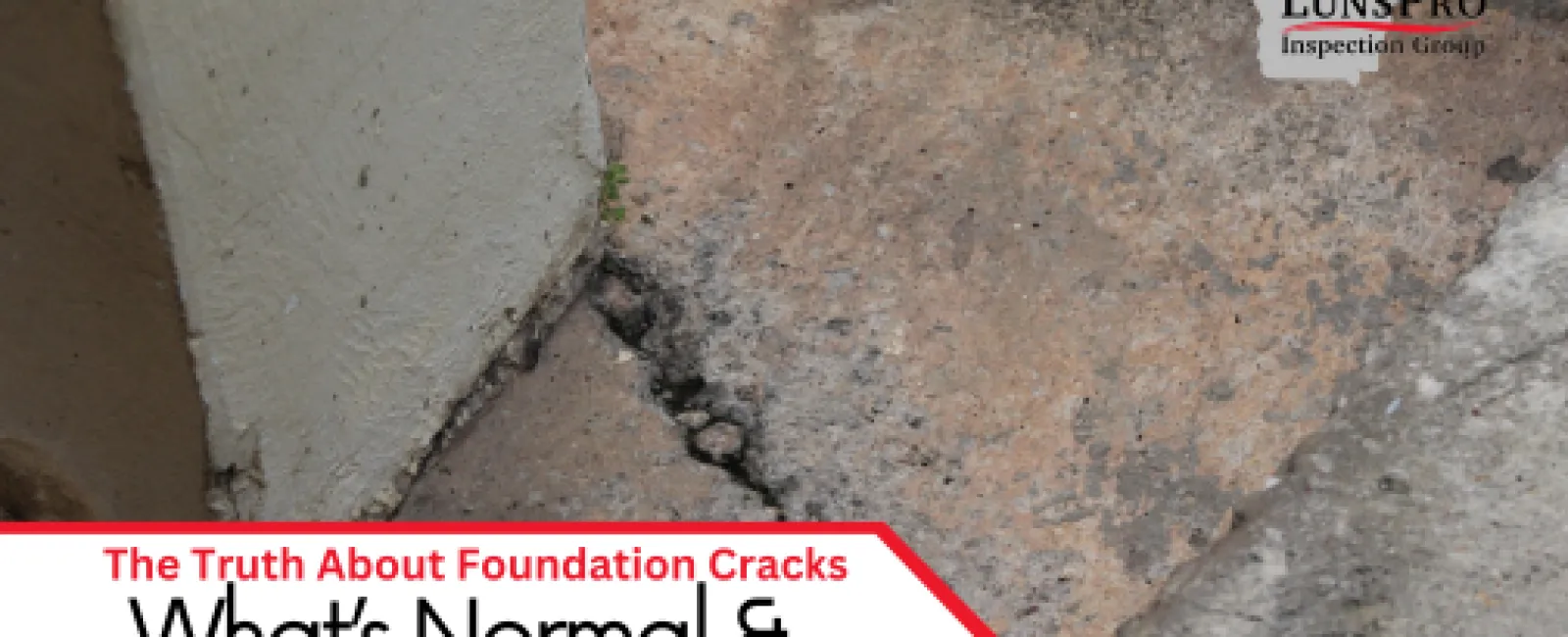When you find a crack in your home's foundation, your first thought might be panic. Is your house falling apart? Will it cost thousands to fix? The reality is more nuanced. Not every foundation crack signals structural failure. But knowing the difference between normal and serious cracks is critical.
At LunsPro Inspection Group, we perform thorough residential and commercial inspections throughout Alpharetta and the greater Atlanta area. Our inspectors evaluate foundation cracks every day, helping homeowners across the region understand what's routine and what's a red flag. Here's what you need to know.
What Causes Foundation Cracks?
Foundations crack for several reasons, many of which are part of normal house aging. Here are some of the most common causes:
1. Concrete Curing When poured concrete dries and hardens, it shrinks. This shrinkage can lead to minor cracks known as shrinkage cracks. These are typically thin, vertical, and occur within the first year of construction. They're usually harmless.
2. Soil Settlement and Shifting Soil under your foundation moves over time. This may be due to moisture changes, poor compaction, or organic material breaking down. As the soil shifts, parts of your foundation may settle unevenly, causing cracks.
3. Hydrostatic Pressure Water in the soil around your foundation exerts pressure on the walls. In rainy climates like Georgia, this pressure can build up and force the foundation walls to crack or bow inward.
4. Temperature Fluctuations Seasonal temperature changes cause the ground and building materials to expand and contract. Over time, this movement can create or worsen cracks.
5. Tree Roots Large trees planted near the foundation can cause damage. Roots grow underneath and draw moisture from the soil, leading to uneven drying and settlement.
Which Cracks Are Normal?
Some foundation cracks are common and not a structural concern. Here's how to recognize them:
- Vertical Hairline Cracks These are the most typical and usually appear in poured concrete foundations. If they are less than 1/8-inch wide and vertical or slightly diagonal, they are likely the result of normal concrete curing or slight settlement.
- Stair-Step Cracks in Mortar Joints In concrete block or brick foundations, small stair-step cracks in the mortar between blocks may appear over time. If they are minor and not widening, they may not be cause for concern.
- Shrinkage Cracks in Basement Floors Thin cracks in concrete basement floors are almost always from the curing process. These don't affect the structural integrity of the home.
Which Cracks Are Serious?
Certain cracks may indicate significant foundation issues. If you spot any of the following, schedule a professional inspection immediately:
- Horizontal Cracks Horizontal cracks in foundation walls are often caused by hydrostatic pressure from outside soil and can be a sign of wall failure or movement. These are serious.
- Wide or Widening Cracks Any crack wider than 1/4 inch, especially if it's growing, is a potential structural issue. This could mean ongoing settlement or stress on the foundation.
- Stair-Step Cracks with Wall Movement If the cracks in brick or block foundations show displacement (one side is higher or pushed in), it's likely a structural problem.
- Cracks Accompanied by Other Signs Be wary if foundation cracks are accompanied by doors that don't close properly, sloping floors, or gaps between walls and ceilings. These signs point to foundation movement.
Climate and Foundation Cracks in Georgia
The climate in Georgia can influence foundation stability. The state's humid subtropical climate means frequent rain, clay-heavy soils, and freeze-thaw cycles that affect foundations.
In Alpharetta and throughout Atlanta, rapid development and soil composition often contribute to foundation issues. These regional factors make professional Atlanta home inspection services especially important.
At LunsPro Inspection Group, our team understands the local soil conditions and climate impact across the metro Atlanta area. We bring that knowledge to every inspection.
How Inspections Help Identify the Severity
Professional residential and commercial inspections are critical when evaluating foundation cracks. Our licensed inspectors look at:
Crack width and direction
Location (walls, floors, corners)
Evidence of movement
Drainage around the property
Structural framing for warping or misalignment
Moisture levels in crawl spaces or basements
We use tools like moisture meters, laser levels, and thermal imaging to assess the full picture. Our reports document the findings and offer repair recommendations if needed.
In some cases, we might suggest further evaluation by a structural engineer or foundation repair specialist. Catching a problem early can save thousands in future repairs.
When to Call a Home Inspector
Don't wait until a small issue becomes a major one. Contact LunsPro Inspection Group if:
You notice new or growing cracks
Cracks are wider than 1/4 inch
There are other signs of movement (sticking doors, sloped floors)
You're buying or selling a property and want a foundation evaluation
We perform Alpharetta residential and commercial inspections throughout the greater Atlanta region. Whether you're in the city or the suburbs, we provide comprehensive home inspection services.
What You Can Do as a Homeowner
While you can't stop all foundation cracks, you can reduce risks:
Control drainage: Make sure your gutters and downspouts divert water away from your foundation.
Keep soil moisture consistent: Avoid letting the soil around your home get too dry or too wet.
Limit tree planting near the house: Tree roots can disrupt soil stability.
Inspect regularly: Walk around your home and basement every few months.
Document any changes and contact a professional if you see worsening conditions.
Not all foundation cracks are cause for concern, but ignoring the wrong ones can lead to serious structural damage. Knowing what's normal and what's not helps you make informed decisions about repairs and maintenance.
The key is observation and action. Don't rely on guesswork when your home's structure is at stake. Especially in areas like Alpharetta and Atlanta, where soil and weather conditions vary widely, regular inspections are essential.
LunsPro Inspection Group offers detailed, reliable Alpharetta residential and commercial inspections. Whether you're worried about a foundation crack or just want peace of mind, we're here to help. Atlanta home inspection services are our specialty, and foundation integrity is a critical part of that service.
Schedule your inspection today to know where your home stands — literally and structurally.

